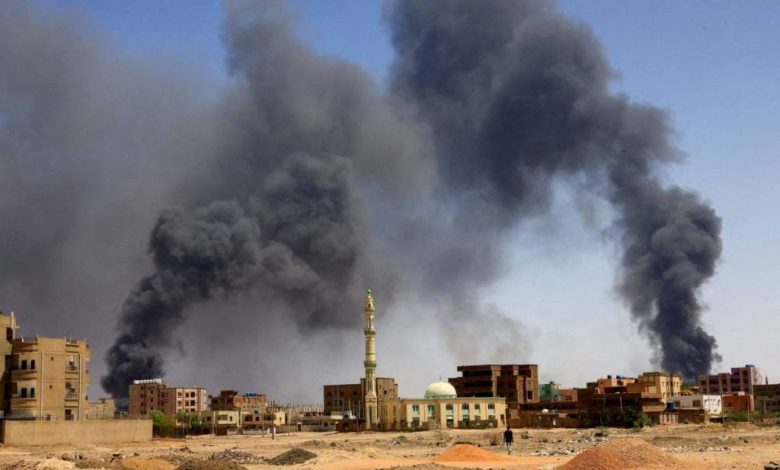Sudan’s War Enters Its Third Year: Is There Any Prospect for a Resolution?

Report by: Al-Noor Ahmed Al-Noor
As the war in Sudan enters its third year, the deep divisions between political rivals and the polarization that prevailed prior to the conflict remain unchanged. Meanwhile, the United Nations has launched a new initiative in hopes of breaking the political deadlock.
Observers believe that some political forces are seeking power through the military establishment, others through the Rapid Support Forces (RSF), while another bloc places its hopes in foreign intervention.
The UN Secretary-General’s Special Envoy to Sudan, Ramtane Lamamra, concluded a recent visit to Port Sudan—the country’s temporary administrative capital—after holding consultations with the head of the Sovereign Council and army commander Abdel Fattah al-Burhan, as well as other council members.
Lamamra renewed his call for an urgent and genuine dialogue between the conflicting parties in Sudan to immediately halt hostilities.
Stalled Talks
The United Nations urged the parties to commit to an inclusive path forward and to enhance civilian protection through potential indirect talks. It reaffirmed the importance of a comprehensive political process to avoid further escalation and to return Sudan to a path of peace and stability.
According to a press statement by the Sovereign Council, Lamamra said al-Burhan responded to all the questions posed, and these responses will be conveyed to UN Secretary-General António Guterres.
The African mechanism for resolving the Sudanese conflict, led by Mohamed Ibn Chambas, hosted separate consultations with three Sudanese political blocs in Addis Ababa this past February, aiming to arrange a Sudanese dialogue—but no progress was made.
The African Union also held expanded consultations in July and August of last year. The first round included pro-army political forces, which produced a document outlining their vision for the agenda of a Sudanese dialogue.
A second round followed, involving the Democratic Civil Forces Coordination (Taqaddum) and two armed factions: the Sudan People’s Liberation Movement-North led by Abdelaziz al-Hilu, and the Sudan Liberation Movement led by Abdel Wahid al-Nur. Although they discussed arrangements for dialogue, no document was issued.
Before that, Cairo hosted a conference in July that brought together various Sudanese political actors under one roof for the first time. However, the final statement of the conference was met with reservations by some groups.
Pro-army political and civil forces then held consultations in Port Sudan, producing a national project document outlining a vision to end the war, address post-war challenges, and pave the way for an inclusive Sudanese dialogue inside the country.
Meanwhile, the “Taqaddum” alliance dissolved itself after some political and armed factions joined a new coalition formed in Nairobi last February under the name “The Founding Sudan Alliance (Ta’sis),” led by the RSF.
Another alliance emerged to replace “Taqaddum” under the name “Democratic Civil Alliance for Revolutionary Forces (Sommoud),” led by former Prime Minister Abdalla Hamdok, which declared neutrality and focused on ending the war.
Yes, But…
Khalid Al-Fahal, a leader in the political and community coalition supporting the army, said that from the start of the war, they aimed to back the military and did not remain neutral. By the end of 2024, the political landscape evolved, leading to talks in Port Sudan that resulted in a consensus among political blocs and civil forces on a national project for Sudanese-Sudanese dialogue within the country.
Al-Fahal told Al Jazeera Net that the Port Sudan consultations addressed post-war challenges through a roadmap that includes a comprehensive vision for managing the transitional period and convening a constitutional conference.
He stated that the political and civil movement agreed on an open and inclusive dialogue—except with those convicted of supporting the RSF. However, senior state officials failed to appreciate this initiative and continued to criticize it and call for its suspension. Still, “we will continue until the war ends, either through combat or peace,” said Al-Fahal.
Simultaneously, a member of the leadership office of the “Sommoud” alliance—speaking anonymously—stated that they are open and welcome any efforts to stop the war and initiate a political process involving all political forces, excluding the National Congress Party and its affiliates.
He told Al Jazeera Net that they met with other groups in Cairo and reached a joint statement, but the other party backed out—indicating that civil forces are not trying to exclude anyone.
He accused pro-army forces of seeking to become the political incubator and participate in power, rather than genuinely working to stop the war or reach a national consensus, which is why the process remains stagnant.
Militarization of the Scene
Political analyst and researcher Khalid Saad believes the primary reason for the failure of a settlement is that some political forces are attempting to impose their vision by exploiting military victories to exclude other factions who oppose the war.
He told Al Jazeera Net that these forces refuse to recognize post-coup changes following October 2021 and the return of some Islamists affiliated with the National Congress Party of ousted President Omar al-Bashir, who were previously sidelined after the youth-led revolution.
Saad believes that the emergence of a new civilian alliance in partnership with the RSF under the “Ta’sis” coalition complicates consensus. It seeks to secure a role in any future settlement. Meanwhile, the army leadership may see any compromise as a threat to its current and future political influence.
He argues that delays in the political process further deepen polarization, weaken chances for civilian unity, empower military actors and their allies, and increase foreign interference.
The analyst predicts that the current slow pace will likely persist until the war ends or until a major shift occurs in the positions of the warring parties. But continued stalemate significantly boosts the militarization of post-war politics, increasing the likelihood of military dominance in governance—not a return of the former National Congress regime, nor a similar power-sharing model to that which existed before Burhan’s October 2021 coup against his partners in the Forces of Freedom and Change.



